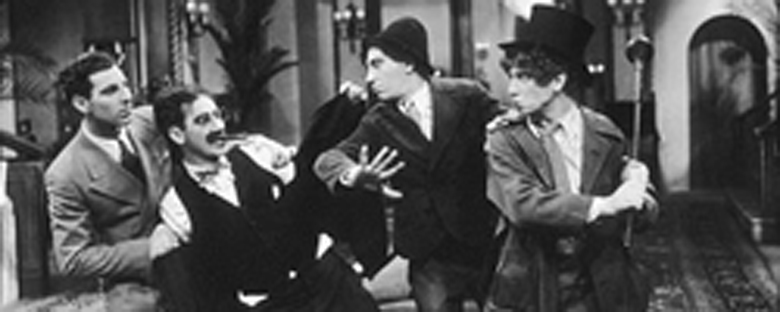Reviews
Robert Florey and Joseph Santley
USA, 1929
Credits
Review by Matt Bailey
Posted on 19 November 2004
Source Universal DVD
Related articles
The United States never had a proper Surrealist movement as France did between the two World Wars. If we had, I am sure that the Marx Brothers would have been a primary influence and point of reference, much as the film comedian Max Linder was for the artists, writers, and other cultural gadabouts in France. The daft anarchy of the comedic family is often akin to watching the id personified and unleashed. Harpo, the most primal of the troupe, is nonverbal and perhaps the most seditious. His funniest acts of comedy in The Cocoanuts, the first feature-length Marx Brothers film, are practically revolutionary in their intent and performance. He is on screen for no more than a few minutes until he is, apropos of nothing, tearing up other people’s mail. Not soon after, he begins to eat the telephone.
Chico speaks for Harpo when it is necessary, but language for Chico is not a tool for communication but a weapon of obfuscation. Chico, it seems, willfully mishears and deliberately mispronounces words. When the subject of a viaduct comes up, Chico can only hear and say, “Why a duck?” A question to which there can be no answer. By refusing to play according to the rules of language, Chico blocks all rationality. He cannot be reasoned with.
Groucho operates on a higher plane of thought than his two more childlike brothers do. Groucho subverts rational thought by appearing to use it. Groucho can begin what seems like a normal conversation but will, when given the chance, spin it into a web of puns, invented words, thoughts spoken aloud, self-referential asides, and contradictory statements. In his flirtations with Mrs. Potter, a society matron played by the indefatigable Margaret Dumont, an insult can become a compliment can become a wisecrack can become a string of nonsense. The humor of Groucho often comes from never knowing where a sentence will go once it begins.
Zeppo often seems like the least useful of the Marx Brothers. It is true that he never developed a comedic character like the other, older three, but that does not mean that he does not have a place in the dissident comedy of the family business. Zeppo is the figure who passes as normal, yet is anything but. He does not have the outlandish behavior of Harpo, the impenetrable anti-logic of Chico, or the diabolical brain of Groucho, but if you watch him carefully you will see that every time the brothers are all together and the film has tipped over into mayhem and chaos, Zeppo is there in the midst of it all, frolicking along with the other three.
How could America have reacted to this utter anarchy of comedy as it slid into the Depression? After such a bloody and terrible war from which the world had only begun to recover? Perhaps the only rational response to such events was to resort to the irrational. Perhaps the only recourse was to find humor and a bit of wisdom in the question, “Why a duck?”
We don’t do comments anymore, but you may contact us here or find us on Twitter or Facebook.



